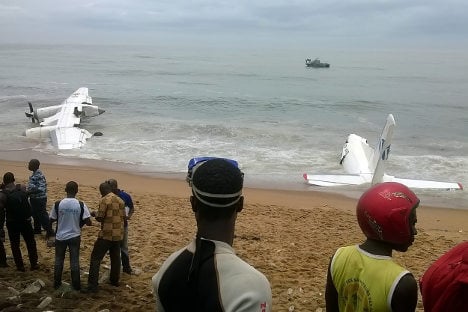Another six people were injured in the crash of the Antonov aircraft which had 10 people on board, firefighter Colonel Issa Sakho told local television.
Four French nationals were among the injured, a French military source said, indicating that the plane had been chartered as part of the anti-jihadist Operation Barkhane.
“There were 10 people on board, Moldovans and French people. The four victims who died are Moldovan nationals,” Sakho said.
The plane had taken off from Ouagadougou in Burkina Faso and crash-landed in the sea near Abidjan, breaking in half, he explained.
Local forces were hoping to secure the wreck before it drifted away “so investigators can do their job”, he said.
A French military source said the Antonov was chartered as part of Barkhane, under which France maintains a 4,000-man mission in the region.
The operation aims to shore up fragile Sahel countries against jihadists who have carried out a wave of bloody bombings, shootings and kidnappings.
Cause of crash unclear
The French military base in Abidjan provides logistical support for the operation which is headquartered in N'Djamena, the capital of Chad. French special forces are stationed in Ouagadougou.
Every year, around 100 sorties are flown out of Abidjan airport as part of Barkhane, often by former Soviet army pilots in Ukrainian-made Antonovs.
The planes frequently carry French military personnel and sub-contractors accompanying their cargo.
There was a heavy storm over Abidjan early Saturday, but it was unclear whether the heavy weather was the cause of the accident.
France keeps around 950 military personnel in Ivory Coast as part of the FFCI force based in the biggest French army base on Africa's Atlantic coast. Other bases are in Libreville, Gabon and Dakar, Senegal.
One of their key missions is to extract French or other western civilians in case of trouble in Ivory Coast or neighbouring countries.
Abidjan is strategically well-placed in the region as most French-speaking African countries can be reached by air in under three hours.



 Please whitelist us to continue reading.
Please whitelist us to continue reading.